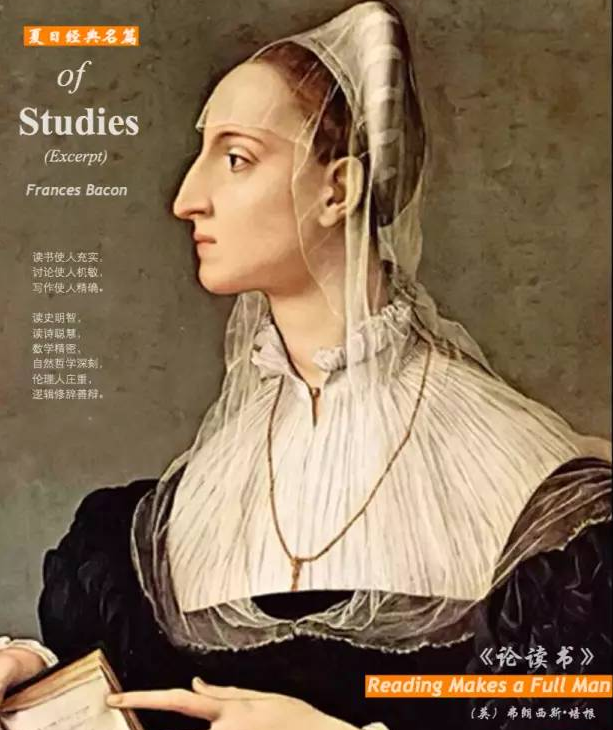Studies serve for delight,for ornament,and for ability.Their chief use for delight is in private ness and retiring;for ornament,is in discourse; and for ability, is in the judgment and disposition of business.
讀書可以陶冶情操,可以藻飾文采,也可以長才益智。讀書的作用于陶冶情操而言,常見于幽居獨處之時;于藻飾文采而言,常見于高談闊論之中;至于長才益智,則表現在裁斷事物之上。
For expert men can execute,and perhaps judge of particulars,one bye one ; but the general counsels,and the plots and marshaling of affairs,come best from those that are learned.
富于經驗之士雖能就事物之枝節一一處理或辨明是非,但縱觀全局,運籌帷幄惟有博學之士最能勝任。
To spend too much time in studies,is sloth;to use them too much for ornament,is affectation;to make judgment only by their rules,is the humor of a scholar.
讀書耗時過多為懶惰;文采藻飾過濫則顯造作;只循章辦事,實為學究怪僻。
They perfect nature,and are perfected by experience: for natural abilities are like natural plants that need pruning by study; and studies themselves do give forth directions too much at large,except they be bounded in by experience.
讀書可完善天性之不足,而經驗又可彌補讀書之不足;因為人的天性猶如自然界之草木,需借助學識予以修整;讀書本身漫無邊際,需通過經驗加以制約。

Crafty men contemn studies,simple men admire them,and wise men use them;for they teach not their own use;but that is wisdom without them,and above them,won by observation.
投機取巧者輕視學習,無知者羨慕學習,明智者則學以致用。因為學問本身并未教人如何加以運用;學以致用的智慧不在書中,而在書外,全憑觀察所得。
Read not to contradict and confute;nor to believe and take for granted; nor to find talk and discourse;but to weigh and consider.
讀書時不要對作者吹毛求疵;也不要輕信、盲從書中所言;更不要尋章摘句作為炫耀之本;而應權衡輕重,斟酌推敲。
Some books are to be tasted,others to be swallowed, and some few to be chewed and digested; that is ,some books are to be read only in parts;others to be read,but not curiously;and some few to be read wholly,and with diligence and attention.
有些書淺嘗即可,有些書只需吞食,而有少數書則應細細咀嚼,將其消化。換言之,有些書只需讀其中部分章節足以;有些書可通讀,但無需太認真;而少數書則應認真細致地通讀。
Some books also may be read by deputy,and extracts made of them by others; but that would be only in the less important arguments,and the meaner sort of books;else distilled books are like common distilled waters,flashy things.
有些書還可以請人代讀,摘錄其中要點即可;但這只限于不甚重要的內容和較次的書籍;否則,經過摘錄的書就猶如蒸餾水般淡而無味。
Reading makes a full man; conference a ready man;and writing an exact man.
讀書使人充實;交談使人機敏;筆記使人精確。
And therefore, if a man write little, he had need have a great memory; if he confer little,he had need have a present wit;and if he read little,he had need have much cunning, to seem to know that he doth not.
因此,不常做筆記者讀書時需有超群的記憶;不常交談者則應有隨機應變之才;不常閱讀者則需要取巧有術,以讓自己的無知顯得有知。
Histories make men wise; poets witty;the mathematics subtle;natural philosophy deep;moral grave;logic and rhetoric able to contend. Abeunt studia in mores. Nay,there is no stand or impediment in the wit,but may be wrought out by fit studies.
歷史使人明智,詩歌使人靈秀;數學使人縝密;物理使人深刻;道德使人莊重;邏輯與修辭使人能言善辯;讀書可以陶冶性情。讀書得當,絕不會使人心智受損,只會益智增才。
Nay there is no stand or impediment in the wit, but may be wrought out by fit studies: like as diseases of the body may have appropriate exercises. Bowling is good for the stone and reins; shooting for the lungs and breast; gentle walking for the stomach ; riding for the head; and the like. So if a man's wit be wandering, let him study the mathematics; for in demonstrations, if his wit be called away never so little, he must begin again. If his wit be not apt to distinguish or find differences, let him study the schoolmen; for they are cymini sectores. (Hair-splitters sim-mini sek-torr-es) If he be not apt to beat over matters, and to call up one thing to prove and illustrate another, let him study the lawyers' cases. So every defect of the mind may have a special receipt.
人之才智但有滯礙,無不可讀適當之書使之順暢,一如身體百病,皆可借相宜之運動除之。滾球利睪腎,射箭利胸肺,慢步利腸胃,騎術利頭腦,諸如此類。如智力不集中,可令讀數學,蓋演題全神貫注,稍有分散即須重演;如不能辯異,可令讀經院哲學,蓋是輩皆吹毛求疵之人;如不善求同,不善以一物闡證另一物,可令讀律師之案卷。如此頭腦中凡有缺陷,皆有特效可醫。











